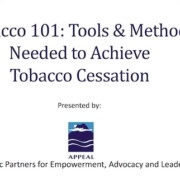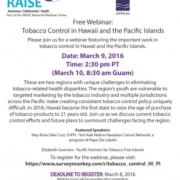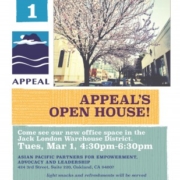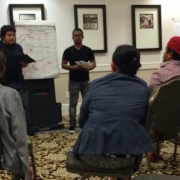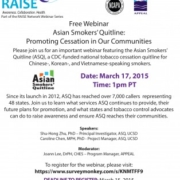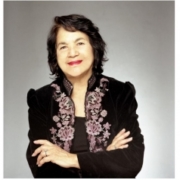Dear Friends and Colleagues,
This has been a challenging year for our communities and our country. Immigrant communities, communities of color and LGBTQ people have been under attack led by the growing xenophobic leadership in our country. And if that is not enough, the problems of tobacco and unhealthy eating have increased in many of our Asian American and Pacific Islander communities. We, at APPEAL, believe that these injustices against our communities require a strategic, comprehensive approach that builds community power and community leadership especially among the younger generation. For nearly 25 years, APPEAL has helped to build community leadership and power to help fight injustices through a nationally-renowned community leadership program resulting in the training of over 1,100 leaders and advocates in the U.S. and the Pacific.
Asian Pacific Partners for Empowerment, Advocacy and Leadership (APPEAL) is a national non-profit health justice organization dedicated to eliminating tobacco use and obesity in the Asian American, Native Hawaiian and Pacific Islander (AANHPI) communities and other communities of color through public health education and advocacy.
We hope that you will join us in supporting APPEAL’s important leadership development work by making a donation of $500 or more. If you would like to make a donation, please click here. This will help us launch our “Youth for Equity and Justice” leadership initiative for 10 young adult leaders in 2018. We have raised $6,500 so far out of our goal of $10,000. Thank you to those of you who have generously donated to this campaign.
APPEAL’s leadership model has been the pillar of our movement on tobacco control and healthy eating and active living. By training and nurturing local leaders, APPEAL is ensuring the sustainability of advocates who can organize their communities to address critical health justice issues. Your contribution is an investment in the long-term health and well-being of Asian American, Native Hawaiian and Pacific Islander communities. Now more than ever we need you to consider a contribution to ensure continued progress in 2018. Your generous and timely contribution is greatly appreciated.
Sincerely yours,
Rod Lew, MPH
Executive Director Board Chair
Kaying Hang, MPH
Thhank you to our presenters and to all those who participated in the webinar!
For those who missed the webinar, a recorded version is available here.
Please join us for an important webinar featuring the tobacco control work underway in Hawaii and the Pacific Islands. These are two regions with unique challenges in eliminating tobacco-related health disparities. The region’s youth are vulnerable to targeted marketing by the tobacco industry and multiple jurisdictions across the Pacific make creating consistent tobacco control policy uniquely difficult. In 2015, Hawaii became the first state to raise the age of purchase of tobacco products to 21 years old. Join us as we discuss current tobacco control efforts and future plans to surmount challenges facing the region.
Date: March 9, 2016, 2:30pm PT/March 10, 2016 8:30am Guam
Featured speakers:
May Rose Dela Cruz, DrPH – ‘Imi Hale Native Hawaiian Cancer Network
Elizabeth Guerrero – Pacific Partners for Tobacco Free Islands
Register at https://www.surveymonkey.com/r/tobacco_control_HI_PI
Deadline to register: March 8, 2016
We’re excited to invite all of our partners, friends, and neighbors to our Open House to celebrate APPEAL’s recent move to new offices!
The Open House is scheduled Tues., March 1, 4:30 – 6:30 p.m., 424 3rd. St., Suite 220, Oakland, CA, 94607 – in the Jack London Warehouse District.
Stop by to chat and check out our new digs, as well as light snacks and refreshments.
Please RSVP to [email protected] or (510) 844-4147.
A passionate and dedicated group from Southern California’s vibrant Asian American, Native Hawaiian, and Pacific Islander (AANHPI) communities gathered recently to hone their leadership skills at a training session conducted by Asian Pacific Partners for Empowerment, Advocacy, and Leadership (APPEAL).
Representatives from Southern California-based AANHPI organizations, Guam Communications Network (CGN), Families In Good Health (FIGH), and Empowering Pacific Islander Communities (EPIC), participated in the leadership development event, Aug. 14-15, under the auspices of APPEAL’s Community-lead Policies and Leadership to Eliminate Disparities for Asian Americans and Pacific Islanders on Tobacco (Com-PLEAT) Program.
(Leadership training participants present a skit to highlight the cultural influences the contribute to the use of tobacco in the Cambodian community)
Community-Based Participatory Research (CBPR) is the main focus of the ComPLEAT Program, but leadership development is also a key element intended to provide vulnerable communities with the skills needed to participate in research as equal partners, as well as the skills needed to lead their communities in campaigns aimed at addressing health disparities.
The August training sessions were designed to increase tobacco control leadership knowledge and skills among community advocates for Native Hawaiian, Pacific Islander, and Cambodian communities including current tobacco issues, coalition building and policy skills, as well as to help community partners prepare for and present on their policy change projects.
EPIC and GCN’s campaigns focus on smoke-free multiunit housing and community smoke-free policies, while FIGH’s campaign focuses on smoke-free skate parks.
Join us for a RAISE Network webinar hosted by APPEAL and the National Council of Asian Pacific Americans (NCAPA) featuring the Asian Smokers’ Quitline (ASQ), a CDC-funded national tobacco cessation quitline for Chinese-, Korean-, and Vietnamese-speaking smokers. Since its launch in 2012, ASQ has reached over 7,000 callers representing 48 states. Join us to learn what services ASQ continues to provide, their future plans for promotion, and what states and tobacco control advocates can do to raise awareness and ensure ASQ reaches their communities.
Date: March 17, 2015
Time: 1pm PT
To register for the webinar, please visit:
https://www.surveymonkey.com/s/KNMTFF9
(Webinar log-in will be provided after registration)
DEADLINE TO REGISTER: March 15, 2015
Speakers:
Shu-Hong Zhu, PhD – Principal Investigator, ASQ, UCSD
Caroline Chen, MPH, PhD – Project Manager, ASQ, UCSD
Moderator:
Joann Lee, DrPH, CHES – Program Manager, APPEAL
Chad Smith, the principal chief of the Cherokee Nation from 1999 to 2011, has been a powerful force in building businesses and working toward self-sufficiency for Native American nations. He has devoted the majority of his adult life to rebuilding the Cherokee Nation and helping Cherokees learn how to help themselves. When he was principal chief, the Cherokee Nation grew its assets from $150 million to $1.2 billion, increased business profits 2,000 percent, improved healthcare services from $18 million to $310 million, created 6,000 jobs, and dramatically advanced its education, language, and cultural preservation programs. The Cherokee Nation’s success is a direct result of his principle-based leadership and his “Point A to Point B” leadership model. This model works for businesses, governments, and people in everyday life situations. His book “Leadership Lessons from the Cherokee Nation” describing this model has been published by McGraw-Hill.
His efforts outside of the government and business arenas are diversified. He is a renowned legal scholar and accomplished public speaker; has published Cherokee art, culture, and history books; produced 10 Cherokee Nation Youth Choir CDs in the Cherokee language; enjoys rebuilding old Studebaker cars; was inducted into the National Wrestling Hall of Fame; rappelled from a 19-story hotel to raise money for Special Olympics; and bicycled the entire 980-mile Trail of Tears as part of a Cherokee youth leadership exercise.
He earned his BS Ed from the University of Georgia, 1973; MPA from University of Wisconsin, 1975; JD from the University of Tulsa, 1980; and MBA from the University of Nevada-Las Vegas, 2008. He has been an ironworker, tax lawyer, assistant district attorney, public defender, visiting professor at Dartmouth College, and principal chief.
He lives in Tahlequah, Oklahoma, with his wife, Bobbie Gail Smith, a first language Cherokee speaker who translates English into Cherokee. He has a leadership and organization consulting practice, which includes public speaking, writing, and development of leadership projects, such as the Vision Center, a hands-on career exploration center. He also practices Indian law.
Dolores Clara Fernandez was born on April 10, 1930 in Dawson, a small mining town in the mountains of northern New Mexico. Her father Juan Ferånández, a farm worker and miner by trade, was a union activist who ran for political office and won a seat in the New Mexico legislature in 1938. Dolores spent most of her childhood and early adult life in Stockton, California where she and her two brothers moved with their mother, following her parents’ divorce.
According to Dolores, her mother’s independence and entrepreneurial spirit was one of the primary reasons she became a feminist. Dolores’ mother Alicia was known for her kindness and compassion towards others. She offered rooms at affordable rates in her 70 room hotel, which she acquired after years of hard work. Alicia welcomed low-wage workers in the hotel, and often, waived the fee for them altogether. She was an active participant in community affairs, involved in numerous civic organizations and the church. Alicia encouraged the cultural diversity that was a natural part of Dolores’ upbringing in Stockton. The agricultural community where they lived was made up of Mexican, Filipino, African-American, Japanese and Chinese working families.
Alicia’s community activism was reflected in Dolores’ involvement as a student at Stockton High School. She was active in numerous school clubs, was a majorette, and a dedicated member of the Girl Scouts until the age of 18. Upon graduating Dolores continued her education at the University of Pacific’s Delta College in Stockton earning a provisional teaching credential. During this time she married Ralph Head and had two daughters, Celeste and Lori. While teaching she could no longer bear to see her students come to school with empty stomachs and bare feet, and thus began her lifelong journey of working to correct economic injustice.
An Organizer is Born
Dolores found her calling as an organizer while serving in the leadership of the Stockton Community Service Organization (CSO). During this time she founded the Agricultural Workers Association, set up voter registration drives and pressed local governments for barrio improvements. It was in 1955 through CSO founder Fred Ross, Sr. that she would meet a likeminded colleague, CSO Executive Director César E. Chávez. The two soon discovered that they shared a common vision of organizing farm workers, an idea that was not in line with the CSO’s mission.
As a result, in the spring of 1962 César and Dolores resigned from the CSO, and launched the National Farm Workers Association. Dolores’ organizing skills were essential to the growth of this budding organization. The challenges she faced as a woman did not go unnoted and in one of her letters to Cesar she joked…”Being a now (ahem) experienced lobbyist, I am able to speak on a man-to-man basis with other lobbyists.”
The first testament to her lobbying and negotiating talents were demonstrated in securing Aid For Dependent Families (“AFDC”) and disability insurance for farm workers in the State of California in 1963, an unparalleled feat of the times. She was also instrumental in the enactment of the Agricultural Labor Relations Act of 1975. This was the first law of its kind in the United States, granting farm workers in California the right to collectively organize and bargain for better wages and working conditions
While the farm workers lacked financial capitol they were able to wield significant economic power through hugely successful boycotts at the ballot box with grassroots campaigning. As the principal legislative advocate, Dolores became one of the UFW’s most visible spokespersons. Robert F. Kennedy acknowledged her help in winning the 1968 California Democratic Presidential Primary moments before he was shot in Los Angeles. Throughout the years she has worked to elect numerous candidates including President Clinton, Congressman Ron Dellums, Governor Jerry Brown, Congresswoman Hilda Solis and Hillary Clinton.
Women’s Liberation
As much as she was Cesar’s right hand she could also be the greatest thorn in his side. The two were infamous for their blow out arguments an element that was a natural part of their working relationship. Dolores viewed this as a healthy and necessary part of the growth process of any worthwhile collaboration. While Dolores was busy breaking down one gender barrier after another, she was seemingly unaware of the tremendous impact she was having on, not only farm worker woman but also young women everywhere.
While directing the first National Boycott of California Table Grapes out of New York she came into contact with Gloria Steinem and the burgeoning feminist movement who rallied behind the cause. Quickly she realized they shared much in common. Having found a supportive voice with other feminists, Dolores consciously began to challenge gender discrimination within the farm workers’ movement.
Non-Violence Is Our Strength
Early on, Dolores advocated for the entire family’s participation in the movement. After all it was men, women and children together out in the fields picking, thinning and hoeing. Thus the practice of non-violence was not only a philosophy but a very necessary approach in providing for the safety of all. Her life and the safety of those around her were in jeopardy on countless occasions. The greatest sacrifice to the movement was made by five martyrs all of whom she knew personally.
At age 58 Dolores suffered a life-threatening assault while protesting against the policies of then presidential candidate George Bush in San Francisco. A baton-wielding officer broke four ribs and shattered her spleen. Public outrage resulted in the San Francisco Police Department changing its policies regarding crowd control and police discipline and Dolores was awarded an out of court settlement.
Following a lengthy recovery she took a leave of absence from the union to focus on women’s rights. She traversed the country for two years on behalf of the Feminist Majority’s Feminization of Power: 50/50 by the year 2000 Campaign encouraging Latina’s to run for office. The campaign resulted in a significant increase in the number of women representatives at the local, state and federal levels. She also served as National Chair of the 21st Century Party founded in 1992 on the principles that women make up 52% of the party’s candidates and that officers must reflect the ethnic diversity of the nation.
Her Second Wind
At 84, Dolores Huerta continues to work tirelessly developing leaders and advocating for the working poor, women, and children. As founder and president of the Dolores Huerta Foundation, she travels across the country engaging in campaigns and influencing legislation that supports equality and defends civil rights. She often speaks to students and organizations about issues of social justice and public policy.
There are thousands of working poor immigrants in the agriculture rich San Joaquin Valley of California. They are unfamiliar with laws or agencies that can protect them or benefits that they are entitled to. They are often preyed upon by unscrupulous individuals who take advantage of them. They often feel hopeless and unable to remedy their situations.
Dolores teaches these individuals that they have personal power that needs to be coupled with responsibility and cooperation to create the changes needed to improve their lives.
It is rarely practiced today because it is tedious and time consuming. However, the results are long lasting and while people are in the process of building organization, they are learning lessons they will never forget and the transformative roots are planted. The fruit is the leadership that is developed and the permanent changes in the community. In other words, this is how grass roots democracy works.
Recognition And Awards
There are four elementary schools in California, one in Fort Worth, Texas, and a high school in Pueblo, Colorado named after Dolores Huerta.
She was inducted into the California Hall of Fame in March of 2013. She has received numerous awards: among them The Eleanor Roosevelt Humans Rights Award from President Clinton in l998, Ms. Magazine’s One of the Three Most Important Women of l997, Ladies Home Journal’s 100 Most Important Woman of the 20th Century, The Puffin Foundation’s Award for Creative Citizenship: Labor Leader Award 1984, The Kern County Woman of The Year Award from the California State Legislature, The Ohtli Award from the Mexican Government, The Smithsonian Institution – James Smithson Award, and Nine Honorary Doctorates from Universities throughout the United States.
In 2012 President Obama bestowed Dolores with her most prestigious award, The Presidential Medal of Freedom, the highest civilian award in the United States. Upon receiving this award Dolores said, “The freedom of association means that people can come together in organization to fight for solutions to the problems they confront in their communities. The great social justice changes in our country have happened when people came together, organized, and took direct action. It is this right that sustains and nurtures our democracy today. The civil rights movement, the labor movement, the women’s movement, and the equality movement for our LGBT brothers and sisters are all manifestations of these rights. I thank President Obama for raising the importance of organizing to the highest level of merit and honor.”
Join APPEAL’s Efforts with the Centers for Disease Control and Prevention’s National Tobacco Education Campaign
The U.S. Centers for Disease Control and Prevention (CDC) launched the second round of their tobacco education campaign last week, Tips from Former Smokers (Tips). The campaign aims to continue raising awareness of the negative health effects caused by smoking, encourage smokers to quit, and encourage nonsmokers to protect themselves and their families from exposure to secondhand smoke through advertisements, public service announcments, and social media outreach. With a national spotlight on tobacco education, now is a critical time for APPEAL and our network members to help in delivering key information and resources to our Asian American Native Hawaiian and Pacific Islander communities.
The U.S. Centers for Disease Control and Prevention (CDC) launched the second round of their tobacco education campaign last week, Tips from Former Smokers (Tips). The campaign aims to continue raising awareness of the negative health effects caused by smoking, encourage smokers to quit, and encourage nonsmokers to protect themselves and their families from exposure to secondhand smoke through advertisements, public service announcments, and social media outreach. With a national spotlight on tobacco education, now is a critical time for APPEAL and our network members to help in delivering key information and resources to our Asian American Native Hawaiian and Pacific Islander communities.
Building on the success of last year’s campaign, the CDC is incorporating new ads highlighting stories of individuals from diverse communities including: African American, Latino, Lesbian, Gay, Bisexual, Transgender (LGBT), and Native American/Alaska Native communities. Additionally, CDC is making a special effort to reach out to Asian American smokers by placing ads that include a “tip” to encourage smokers to call the Asian Smokers’ Quitline in various Asian-language newspapers across the country.
To support these national tobacco education efforts, APPEAL encourages network members to help spread these critical messages to our communities and encourage them to get involved.
Here’s what you can do to help:
- Share campaign materials with your clients, patients, or community members: Post the Tips videos and other relevant Tips information on your website or social media channels. Visit the Tips website.
- Raise our communities’ voices in the fight against tobacco: Encourage community members to share personal stories on how tobacco has changed their life on the National Networks website.
- Promote culturally appropriate resources for quitting tobacco: The Asian Smokers’ Quitline provides free in-language services to those who speak Chinese, Korean or Vietnamese.
With the help of network members, APPEAL hopes to shed further light on how tobacco is impacting Asian American, Native Hawaiian and Pacific Islander communities. If you need assistance with your efforts, please contact us at [email protected].


